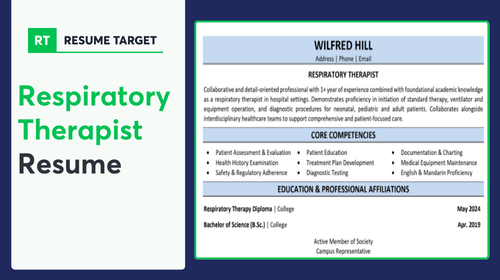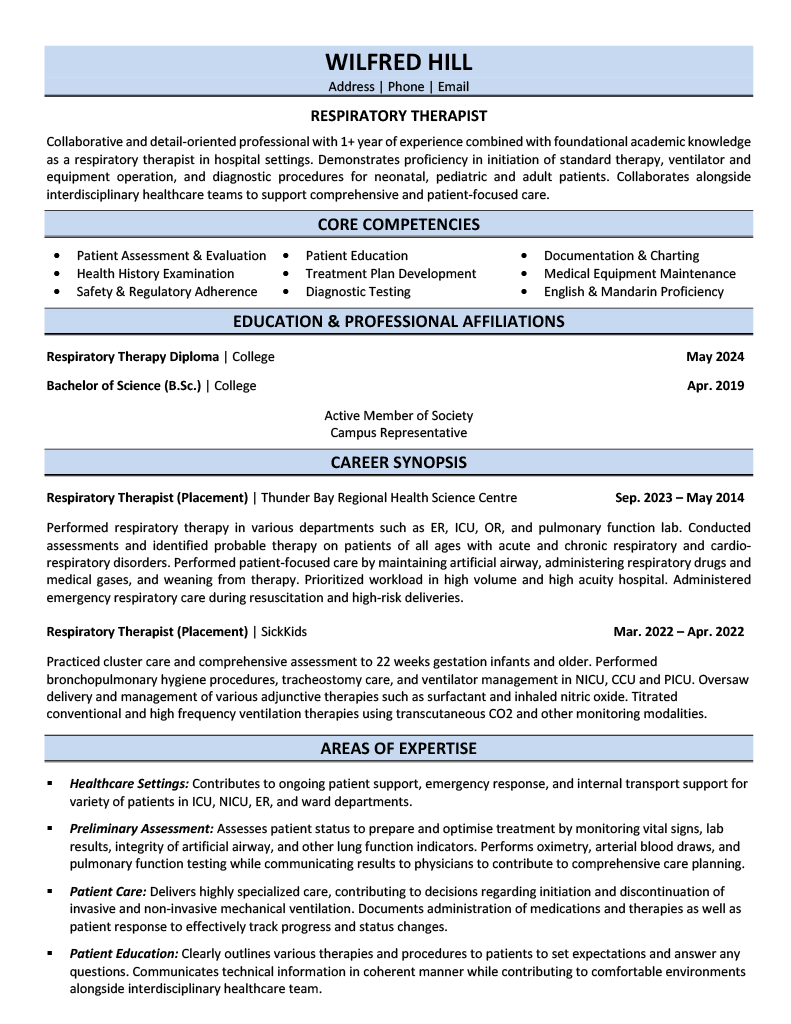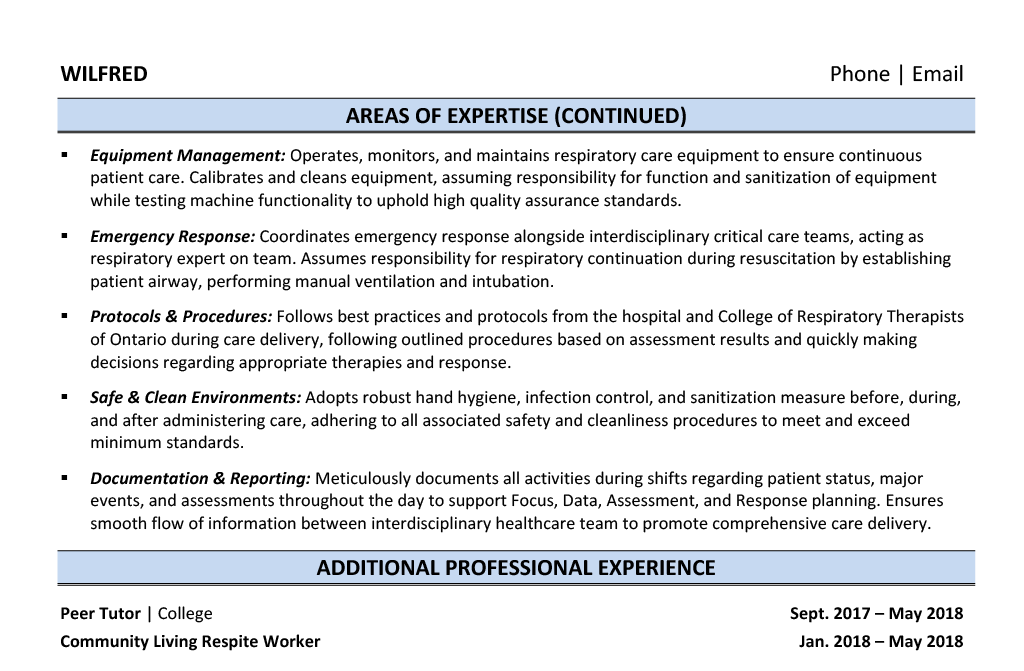

Respiratory Therapists do life-saving work every day, but describing that impact on a resume leaves many feeling breathless. Your clinical expertise deserves more than just a list of duties and certifications.
Are you struggling to translate your hands-on patient care into compelling resume content? A well-crafted resume can showcase both your technical abilities and your crucial role in patient outcomes.
Resume Target specializes in helping Respiratory Therapists demonstrate their full professional value. We'll show you how to highlight your clinical expertise, emergency response skills, and patient care success stories in a way that hiring managers can't ignore.


When every breath matters, respiratory therapists step in as vital lifelines, providing specialized care for patients ranging from premature infants to elderly adults with complex lung diseases.
Working alongside doctors and healthcare teams, these breathing specialists manage life-supporting ventilators, administer targeted respiratory medications, and conduct crucial diagnostic tests to evaluate and improve patients' lung function.
If you're considering this rewarding healthcare career, you'll discover diverse opportunities to specialize in areas like neonatal care, critical care, or pulmonary rehabilitation, with each path offering unique ways to make a difference in patients' lives.
Let's talk about your earning potential as a Respiratory Therapist! Here's what's exciting: your career path offers substantial financial growth opportunities, especially when you pursue specializations like neonatal or pediatric care. And guess what? Your compensation can significantly increase as you gain experience and expertise in different healthcare settings.
Figures from: CareRev
Note: I've distributed the salary range provided in the data across experience levels to create a progression, while keeping the entry-level, average, and maximum figures accurate to the source material.From entry-level care to specialized expertise, respiratory therapy offers diverse advancement opportunities. Your career can progress from clinical practice to leadership roles with the right credentials and experience.
Beyond basic patient care, advancing in respiratory therapy requires specialized clinical expertise and leadership capabilities.
- Advanced Life Support Certification - Ventilator Management Proficiency - Clinical Assessment and Diagnostics - Team Leadership and CommunicationTo become a Respiratory Therapist, you'll need to earn an associate's degree from an accredited respiratory therapy program and obtain state licensure - a rewarding path that typically takes 2-3 years.
To excel in this field, you'll need to develop key qualities like compassion and strong interpersonal skills while working closely with patients and healthcare teams.
Requirements from American Association for Respiratory Care
From bustling hospitals in California to physician offices in Texas, respiratory therapy jobs thrive across healthcare settings.
Figures from U.S. Bureau of Labor Statistics
Struggling to capture all your patient care experience, technical skills, and clinical expertise in a way that stands out to healthcare employers? This comprehensive, section-by-section guide will walk you through creating a powerful respiratory therapist resume that showcases your ability to deliver quality patient care.
As a Respiratory Therapist who spends your days focused on patient care and complex medical procedures, sitting down to write about yourself can feel like an overwhelming task.
While you excel at managing ventilator settings and developing treatment plans, translating your clinical expertise and patient care skills into a compelling career summary requires a different kind of expertise - but it's essential for helping hiring managers quickly understand your unique value.
How would you describe your overall approach to patient care and respiratory therapy across different healthcare settings you've worked in?
Reason: This helps frame your professional philosophy and adaptability, showing potential employers how you view your role in the broader healthcare context. It sets the tone for your entire summary by highlighting your patient-centered focus.
What combination of technical respiratory care skills and interpersonal abilities best defines your professional identity as a Respiratory Therapist?
Reason: This question helps you balance clinical expertise with soft skills in your summary, demonstrating your complete professional package to employers who need both technical competence and strong patient communication.
How has your experience with different respiratory conditions and treatment modalities shaped your development as a healthcare professional?
Reason: This prompts you to reflect on your professional growth and expertise breadth, helping craft a summary that shows both your clinical knowledge depth and commitment to the respiratory therapy field.
As a respiratory therapist, you need to showcase both your clinical expertise and your ability to work effectively in fast-paced healthcare environments while handling critical patient care situations.
Your skills section should highlight your proficiency with respiratory equipment and procedures, while also emphasizing your patient care abilities and emergency response capabilities - from operating mechanical ventilators to performing pulmonary function testing.
Showcase your clinical expertise and patient care impact by organizing your respiratory therapy experience into three powerful sections: a concise role overview, measurable patient outcomes and achievements, and your core clinical responsibilities.
Many Respiratory Therapists struggle to translate their daily patient care activities into compelling achievements that catch hiring managers' attention. Transform your clinical experience into powerful metrics by connecting your interventions to improved patient outcomes, reduced readmission rates, and enhanced respiratory care protocols.
A strong responsibilities section demonstrates how Respiratory Therapists provide critical patient care beyond basic breathing treatments. Your duties should clearly show both technical medical expertise and patient care abilities while connecting your role to overall hospital operations and patient outcomes.
Your respiratory therapy credentials and education are crucial for demonstrating your qualifications to provide critical respiratory care. Start with your highest level of education and include your RRT certification, state licenses, and any specialized credentials like NPS or ACCS that showcase your expertise in specific areas of respiratory care.
Now that you've created a strong foundation using Resume Target's comprehensive resume writing guidelines, you're ready to transform your resume into a powerful tool for landing respiratory therapy positions.
While many healthcare professionals focus solely on customizing their cover letters, tailoring your respiratory therapist resume for each specific role is equally crucial in today's competitive healthcare job market.
A customized resume not only helps you navigate through hospital and clinic ATS systems by incorporating relevant keywords, but it also demonstrates to hiring managers how your specific skills and experiences align perfectly with their patient care needs and respiratory department requirements.
Ready to stand out from other respiratory therapy candidates? Let's transform your resume into a targeted document that showcases exactly why you're the perfect choice for each position you pursue!
Don't let a lack of professional experience hold you back from pursuing your dream career as a Respiratory Therapist!
Your clinical rotations, healthcare certifications, and relevant coursework can create a compelling story of your readiness to provide quality patient care.
Focus on highlighting your patient care experience, technical skills with respiratory equipment, and your understanding of cardiopulmonary procedures.
For more guidance on structuring your healthcare resume, check out the Student Resume Writing Guide to ensure you're showcasing your clinical competencies effectively.
Your resume summary is your chance to showcase your clinical rotations, healthcare certifications, and patient care experience that make you an ideal candidate for respiratory therapy positions.
Focus on highlighting your hands-on training with ventilators, your understanding of cardiopulmonary conditions, and your dedication to compassionate patient care.
"Dedicated and detail-oriented Respiratory Therapist graduate with comprehensive clinical rotation experience across pediatric, adult, and critical care settings. Proficient in ventilator management, arterial blood gas analysis, and respiratory assessments, with additional experience in patient education and care plan development. Demonstrated strong technical aptitude through successful completion of 800+ clinical hours, maintaining 100% compliance with safety protocols. Seeking to leverage clinical expertise and passion for patient care as a Respiratory Therapist at a leading healthcare facility."
Now's your chance to showcase the specialized medical training and clinical expertise that makes you a qualified respiratory care professional!
Transform your educational background into compelling content by highlighting relevant coursework like cardiopulmonary anatomy, mechanical ventilation labs, and clinical rotations - then feature impactful projects like your experience with patient care plans or ventilator management protocols.
A degree/certification for Respiratory Therapists typically includes courses such as Medical Terminology, Management Principles, Healthcare Policy, Pharmacology, Pathophysiology, Health Sciences Research [1], Fundamentals of Respiratory Therapy, Equipment Introduction, Clinical Practicums, Cardio-Respiratory Physiology, Pulmonary Function Testing, Microbiology, Anatomy and Physiology, Physics, Clinical Medicine, Mathematics, Chemistry, and General Psychology [2].Relevant Coursework: Medical Terminology | Cardio-Respiratory Physiology | Pulmonary Function Testing | Clinical Medicine | Pharmacology | Pathophysiology
Key Projects:
Ventilator Management Simulation Project: Developed comprehensive ventilator management protocols through simulation-based training, resulting in improved patient care outcomes and standardized response procedures.
Clinical Research Initiative: Collaborated with a team of healthcare professionals to study the effectiveness of various breathing techniques in post-operative recovery.
Leverage your clinical training, internship experiences, and technical certifications to create a compelling skills section that showcases your ability to provide essential respiratory care while meeting healthcare facility standards.
As an entry-level Respiratory Therapist, your combination of clinical knowledge and patient care skills positions you well for a rewarding career in this growing healthcare field, where the demand for qualified professionals continues to rise.
When you spend your days focused on helping patients breathe easier, finding the right words to capture your impact and clinical expertise on paper can feel overwhelming - especially when trying to balance technical skills with your compassionate patient care approach.
At Resume Target, we understand the unique challenges respiratory therapists face in today's evolving healthcare landscape, from emergency response scenarios to long-term care management.
Our healthcare resume experts have helped hundreds of RTs showcase their clinical excellence and secure positions at leading hospitals and medical centers across the country.
With healthcare facilities actively seeking skilled respiratory therapists right now, don't let an outdated resume hold you back - contact us today to transform your clinical experience into a powerful career marketing tool.
Impress any hiring manager with our Medical resume writing service. We work with all career levels and types of Medical professionals.
Learn More → Medical Resume Writing Services